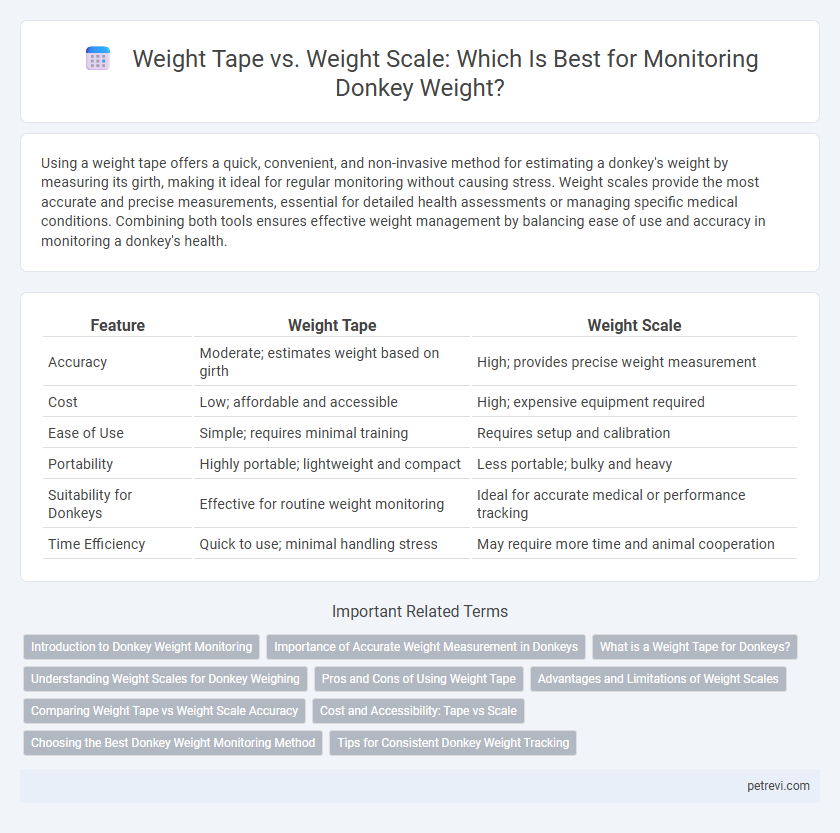Using a weight tape offers a quick, convenient, and non-invasive method for estimating a donkey's weight by measuring its girth, making it ideal for regular monitoring without causing stress. Weight scales provide the most accurate and precise measurements, essential for detailed health assessments or managing specific medical conditions. Combining both tools ensures effective weight management by balancing ease of use and accuracy in monitoring a donkey's health.
Table of Comparison
| Feature | Weight Tape | Weight Scale |
|---|---|---|
| Accuracy | Moderate; estimates weight based on girth | High; provides precise weight measurement |
| Cost | Low; affordable and accessible | High; expensive equipment required |
| Ease of Use | Simple; requires minimal training | Requires setup and calibration |
| Portability | Highly portable; lightweight and compact | Less portable; bulky and heavy |
| Suitability for Donkeys | Effective for routine weight monitoring | Ideal for accurate medical or performance tracking |
| Time Efficiency | Quick to use; minimal handling stress | May require more time and animal cooperation |
Introduction to Donkey Weight Monitoring
Accurate donkey weight monitoring is essential for managing health, nutrition, and medication dosages effectively. Weight tapes offer a quick, affordable, and non-invasive method based on heart girth measurements, while weight scales provide precise and direct readings but may require specialized equipment. Balancing convenience and accuracy helps ensure proper care and early detection of potential health issues in donkeys.
Importance of Accurate Weight Measurement in Donkeys
Accurate weight measurement in donkeys is crucial for proper dosing of medications, nutritional management, and overall health monitoring. Weight tapes provide a quick, non-invasive estimation based on girth measurements but often lack precision compared to weight scales. Utilizing a weight scale ensures reliable data, enabling effective medical treatment and optimized care for donkeys.
What is a Weight Tape for Donkeys?
A weight tape for donkeys is a practical tool designed to estimate an animal's body weight by measuring the girth circumference around the ribcage, just behind the front legs. This flexible, graduated tape provides a quick and cost-effective way to monitor weight changes without requiring a full-scale weight measurement. While less precise than a digital weight scale, weight tapes offer convenience for routine health assessments and dosage calculations for medications in donkeys.
Understanding Weight Scales for Donkey Weighing
Weight scales provide precise measurements by capturing the exact mass of a donkey, making them the most reliable tool for monitoring donkey weight accurately over time. Unlike weight tapes, which estimate weight based on body circumference and can be influenced by factors like body condition or conformation, digital or mechanical weight scales eliminate guesswork by offering consistent readings. Understanding the proper use and calibration of weight scales ensures accurate weight monitoring, critical for managing a donkey's health, diet, and medical treatment.
Pros and Cons of Using Weight Tape
Weight tape offers a simple, cost-effective method for estimating donkey weight by measuring girth circumference, making it accessible for regular monitoring without the need for expensive equipment. However, weight tape accuracy can be affected by factors such as the animal's body condition, conformation, and operator technique, often leading to less precise results compared to weight scales. While weight scales provide more exact weight measurements, weight tape remains a practical tool in field conditions where scales are unavailable or impractical.
Advantages and Limitations of Weight Scales
Weight scales provide precise and immediate measurements essential for accurate donkey weight monitoring, enabling tailored health and nutrition management. However, the high cost, need for regular calibration, and the difficulty of safely positioning uncooperative donkeys on the scale can limit practical use. Despite these challenges, weight scales remain the most reliable tool for tracking weight changes in veterinary and research settings.
Comparing Weight Tape vs Weight Scale Accuracy
Weight scales provide precise and consistent weight measurements for donkeys, often accurate within a few pounds, making them highly reliable for health monitoring and medication dosing. Weight tapes estimate weight based on girth circumference, offering a convenient and affordable alternative, but their accuracy can vary due to factors like body condition, breed, and tape placement. While weight scales are preferred for critical evaluations, weight tapes serve as useful tools for routine weight estimations when scales are unavailable.
Cost and Accessibility: Tape vs Scale
Weight tapes offer an affordable and accessible solution for monitoring donkey weight, typically costing under $20 and requiring no electrical power or specialized training. Weight scales provide precise measurements but often involve a significant investment, ranging from several hundred to thousands of dollars, limiting accessibility for small-scale or remote owners. The portability and ease of use of weight tapes make them a practical choice for routine weight tracking in various settings.
Choosing the Best Donkey Weight Monitoring Method
Using a weight tape provides a quick, non-invasive method to estimate donkey weight by measuring girth, offering convenience for routine checks. Weight scales deliver precise and accurate weight readings, essential for tracking health changes or medication dosages. Selecting the best donkey weight monitoring method depends on balancing accuracy needs with practicality and frequency of measurements.
Tips for Consistent Donkey Weight Tracking
Regularly measure the donkey's girth using a weight tape at the same location to ensure accurate weight estimates, as discrepancies often arise from inconsistent placement. Combine weight tape measurements with periodic weight scale readings to validate tracking accuracy and adjust for growth or health changes. Maintain a consistent measurement schedule, ideally weekly or biweekly, to monitor weight trends effectively and detect early signs of weight loss or gain.
Weight Tape vs Weight Scale for Donkey Weight Monitoring Infographic

 petrevi.com
petrevi.com